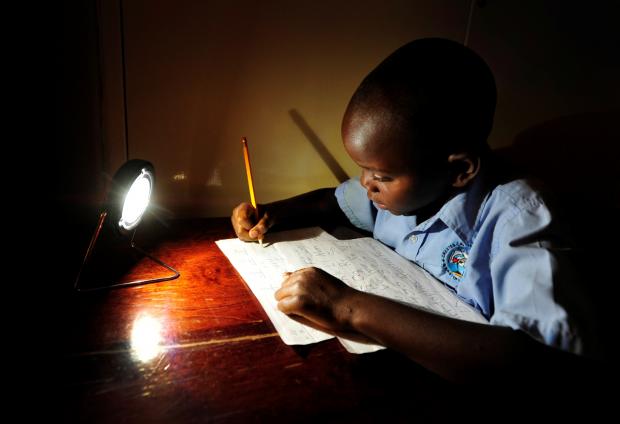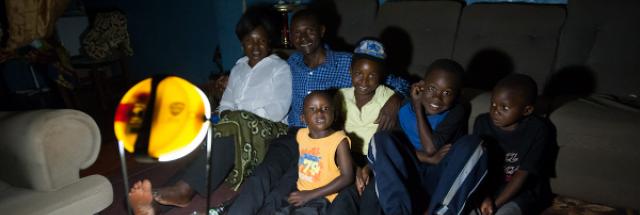 Keith Neal retired in 1999 after 23 years as Head of Biology at Manchester Grammar School. He has been associated with the work of IofC since his student days and continues to be much involved with projects in Africa.
Keith Neal retired in 1999 after 23 years as Head of Biology at Manchester Grammar School. He has been associated with the work of IofC since his student days and continues to be much involved with projects in Africa.
Joseph Karanja is a highly-qualified Kenyan lawyer. He has been a friend of mine for over 20 years. He was brought up in Eldoret, an important city in Western Kenya. He remembers struggling to get educated without any electric light in the house. However, through sheer determination, he succeeded. He is an entrepreneur of high integrity, who is determined to help Kenyans lift themselves out of poverty and enjoy a satisfying life.
Although Joseph’s legal practice is in Nairobi, he has never forgotten the poor and dispossessed in his home area. In 2007, Eldoret was the epicentre for inter-tribal violence following presidential and parliamentary elections. In spite of this history, many refugees from the surrounding area have settled in and around Eldoret in make-shift accommodation. Joseph, a local church, and a group of business people, are working together to help a community consisting of just over 400 refugee families – that is well over 2,000 people.
A year ago, I introduced Joseph to SunnyMoney, the trading arm of SolarAid, which sell a wide range of solar products, designed to meet the lighting needs of people who have no access to mains electricity. Solar lights save money, and reduce dependency on kerosene and candles.
Solar lights have been one of the tools used to help transform this community. Remarkable progress has been made in addressing the need for education, employment and income generation, but most significantly this would not have been possible without a strategy to create peace and reconciliation within the community. Solar lights have, surprisingly, been a key to achieving this.
Under Joseph’s initiative, solar lights were trialled in Munyaka, a very poor part of Eldoret. This community is a microcosm of Kenya’s needs as a country. The families come from previously warring tribes, who are deeply suspicious of each other. They live side by side only because there is no other accommodation for them. What they have in common is their refugee status. They have lost everything. Some children are orphans and many have only one parent.
 Joseph established an organising committee, which works in partnership with the Munyaka Anglican Church of Kenya, led by Reverend Waweru.
Joseph established an organising committee, which works in partnership with the Munyaka Anglican Church of Kenya, led by Reverend Waweru.
In Munyaka, only 10 per cent of the population have access to electricity. A connection to the grid costs £245, which is beyond the reach of most, who are poor and depend on firewood and kerosene. Those who cannot afford kerosene, do not have any light at night and their children miss out on doing homework.
The project has focussed on these 400 refugee families. Through the auspices of the church, the organising committee provides small loans, up to £28, that are given to enterprising women and men to buy solar lights. The committee includes 24 women representatives from the community.
A small solar study light costs around £8.50 and the more powerful Sun King Pro sells at £24. Today, 18 Sun King Pros are being used by women at night, outside their homes, where they sell their own produce. The lights can also be used to charge a mobile phone. The loans are paid back from the profits made. Each borrower is encouraged to keep 14 pence a day to pay back the loan.
Loans are not limited to the purchase of solar lights. They are also provided to community members who want to set up local enterprises.
Over 260 families are now in possession of a solar light
Joseph Karanja says that solar lights are used as a tool for peace and reconciliation. He writes:
‘Our group is using solar lamps as a symbol of peace and development. First, when a person on one side goes out to reconcile, he or she will present the lamp as a gift to the other side. It signifies that the person making peace will be transparent and not undermine the other. It is walking in the light. Secondly, it is a symbol of purity. Unlike kerosene lamps and firewood, which emit smoke, solar is clean energy. It signifies that there will be no more external influences that harm a fellow human being. In our context, politicians pollute our minds especially during elections. Finally, by presenting a solar lamp, the recipient is empowered to read and write and to carry out an economic activity, however small, which is beneficial. Each successful reconciliation motivates them to take on more challenges.
‘Our community in Eldoret was once deeply divided, but today it is fostering healing and reconciliation. Our community for close to a month has been working with a huge population of South Sudanese living in Eldoret to reconcile with one another. Great success has already been achieved.
‘We managed to buy 20 solar lamps from SunnyMoney in December 2013. Our community will donate them to pastoralist communities of Baringo, a neighbouring county. So far, 60 lights have been donated. The Deputy Governor of Baringo, Mathew Tuitoek, is organising the visit. Members of the Eldoret community will share their experience of peace and sustainable development with the troubled communities of Baringo, who are infected with the disease of animal rustling.’


